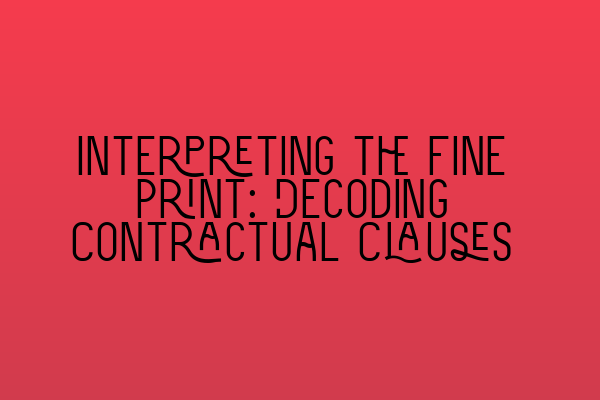Interpreting the Fine Print: Decoding Contractual Clauses
In the realm of contract law, understanding the fine print is paramount. The seemingly inconspicuous clauses buried within contracts can have significant implications for the parties involved. It is crucial to decode and interpret these contractual clauses accurately to ensure fair and lawful dealings.
1. Introduction to Contractual Clauses
Contractual clauses are specific provisions or terms that are included in a contract to outline the rights, obligations, and expectations of the parties involved. These clauses govern various aspects of the agreement, including payment terms, delivery schedules, dispute resolution mechanisms, and more.
When drafting or reviewing a contract, it is important to pay careful attention to these clauses, as they can shape the entire contractual relationship. Failure to comprehend their implications could lead to disputes, financial losses, and legal complications down the line.
2. Key Elements of Contractual Clauses
While each contract may contain unique clauses tailored to the specific circumstances, there are several common elements that can help decipher their meaning:
a. Definitions:
Understanding the definitions of key terms used in the contract is crucial. Terminology within the contract may have specific meanings that differ from their common usage. Familiarizing yourself with these definitions will help you accurately interpret the contractual language.
b. Conditions:
Contracts often include conditions that must be fulfilled for certain actions or obligations to come into effect. These conditions may be explicit or implied and can significantly impact the rights and responsibilities of the parties involved. Diligently identifying and comprehending these conditions is essential for interpreting the contract accurately.
c. Rights and Obligations:
Clause by clause, the contract delineates the rights and obligations of each party. These clauses outline who has the power to act, what they can or cannot do, and the consequences of non-compliance. It is crucial to comprehend these provisions to ensure compliance and avoid any potential legal pitfalls.
d. Termination and Remedies:
Contracts include provisions specifying the circumstances under which the agreement may be terminated and the remedies available to the parties in case of breach. Familiarizing yourself with these clauses will aid in understanding the consequences of non-performance and the available avenues for seeking compensation or redress.
3. Interpreting Contractual Clauses
Interpreting contractual clauses can be a complex process, involving a combination of legal expertise and contextual analysis. Here are some guiding principles to help navigate through the fine print:
a. Plain Language:
Contracts should be drafted in clear and unambiguous language. However, this is not always the case. When faced with convoluted clauses, it is essential to unravel their true meaning. Breaking down complex sentences, consulting definitions, and seeking legal advice when necessary can help clarify the intended interpretation.
b. Legislative Framework:
Legal systems often provide guidelines for interpreting contracts. Familiarize yourself with the applicable legislation and case law that can inform your understanding of contractual clauses. This knowledge will provide insights into judicial interpretations, legal precedents, and industry standards that may influence contract interpretation.
c. Intent of the Parties:
Analyze the intention behind the contract by considering the background, negotiations, and commercial context. This broader understanding can shed light on the purpose and objectives of the contractual clauses, helping to determine their intended meaning.
d. Entire Agreement and Interpretation Clauses:
Contracts may include entire agreement clauses or interpretation clauses explicitly stating how disputes over interpretation are to be resolved. These clauses can guide the interpretation process and provide additional context for understanding the parties’ intentions.
e. Expert Advice:
When dealing with complex contracts or unfamiliar clauses, seeking expert legal advice is wise. A solicitor experienced in contract law can provide valuable insights and ensure that your interpretation aligns with legal principles and industry standards.
Interpreting contractual clauses correctly is essential to avoid disputes and negative legal ramifications. It requires meticulous attention to detail, legal expertise, and a comprehensive understanding of the contract as a whole.
For more resources on contract law and the SQE exams:
- SQE 1 Practice Exam Questions
- SQE 1 Practice Mocks FLK1 FLK2
- SQE 2 Preparation Courses
- SQE 1 Preparation Courses
- SRA SQE Exam Dates
Remember, while it may take extra time and effort to interpret contractual clauses accurately, doing so is essential to protect your rights and ensure a fair and lawful agreement.
